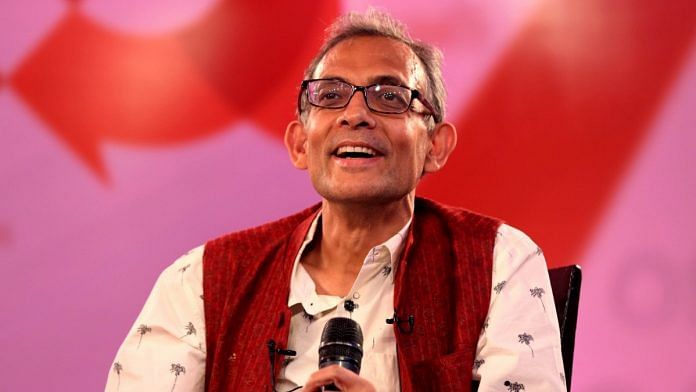New Delhi: Eight video clips of 2.5 minutes each by Nobel laureate Abhijit Banerjee delivered to 2.5 crore West Bengal residents saw a rise in reporting of Covid-19 symptoms to frontline health workers as well as greater adherence to preventive measures, found a paper authored by the economist and others.
The working paper published this month in the National Bureau of Economic Research pointed out that the results of a randomised control trial (RCT) by economists in West Bengal in May showed that celebrity messaging, in addition to the existent large scale government messaging, can have a large impact on people’s behaviour with regard to Covid-19 by nudging people to follow best practices.
Under RCT, two groups are treated differently to assess the impact of a particular step.
The results of the trial showed overall greater compliance among those who received the video messages like higher symptom reporting, better personal hygiene, wearing of masks and not travelling outside the villages. It also noticed spillovers of the messaging from those who received the messages to those who did not.
“First, reporting of symptoms to the frontline health workers, critical to the tracking of the epidemic, doubled… Second, rates of not leaving the village, washing hands and wearing masks improved significantly in treatment communities,” the paper said. “…Third, distancing (hygiene) went up in the sample.”
Banerjee, who pursued his initial education in West Bengal, is well known among its local population and has been felicitated by the state government after he won the Nobel prize for Economics last year.
He is also on the state’s Covid advisory board.
The paper also concluded significant community diffusion of health behaviours across other non-recipients. Also, there was an improvement in the practice of wearing masks despite no explicit messages to that effect.
Also read: Mamata govt turns stadiums, schools and lodges into Covid hospitals as cases surge in Bengal
Govt messaging was ignored or forgotten
The paper pointed out how absorbing and acting on multiple streams of information may be challenging. “…Despite the ubiquity of messages, or perhaps because of it, compliance with basic recommendations is far from complete,” it said.
It said despite a nationwide lockdown in India during the time of the trial, on an average, 37 per cent of the respondents in the control group left their village at least once every two days. Washing of hands when returning home was also not universally followed.
“This suggests that the Indian government’s public health messaging was either ignored, forgotten, misunderstood, or insufficiently disseminated within the community,” the paper pointed out.
India has seen many celebrities talk about social distancing during the pandemic. Actors such as Amitabh Bachchan, Salman Khan, Priyanka Chopra, Ranbir Kapoor, Shah Rukh Khan and Alia Bhatt and regional superstars such as Rajinikanth, Chiranjeevi and Mammootty have all used their celebrity status to spread awareness.
How the trial was conducted
Banerjee recorded eight separate 2.5-minute clips.
The scripts were drafted under the guidance of Abhijit Chowdhury, physician member of the West Bengal Covid-19 advisory board, and Marcella Alsan, another physician, the paper said. Both are also co-authors of this study.
The other co-authors include Emily Breza, Arun G. Chandrasekhar, Esther Duflo, Paul Goldsmith-Pinkham and Benjamin A. Olken.
The videos either encouraged people to maintain a 2-metre distance or regular washing of hands or refraining from spitting. Some also talked about ostracism. Every message concluded by encouraging the individual to contact a health worker if they exhibit Covid-19 symptoms like fever or coughing.
These video messages were then sent out as YouTube links embedded in a text message to 25 million (2.5 crore) Reliance Jio subscribers. These subscribers were randomly selected from the 28 million or 2.8 crore subscribers the firm had in the state. The remaining 3 million (30 lakh) subscribers were sent texts containing a link to a government website on Covid-19.
These messages were sent across 1,214 of the state’s 1,264 PIN codes, the survey said, covering an estimated 88 million people.
To assess the impact of the messages, the trial analysed the reporting of symptoms by people to health workers within five days of receiving the message.
It found that among those who received the specialised messages, reporting of fevers increased by 110 per cent, reporting of respiratory problems increased by 94 per cent. It also showed that while travel outside the village reduced by 20 per cent, hand washing increased by 7 per cent.
Also read: Bengal imposes strict lockdown, new containment zones to remain ‘completely shut’ for 7 days



